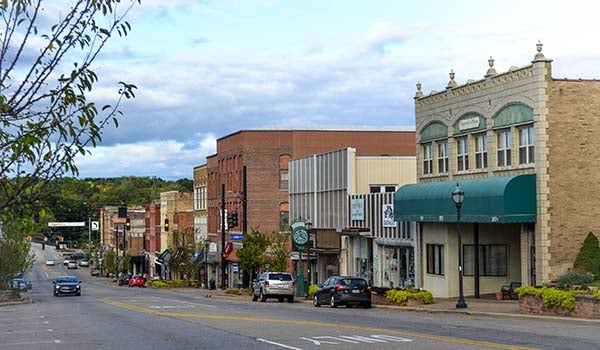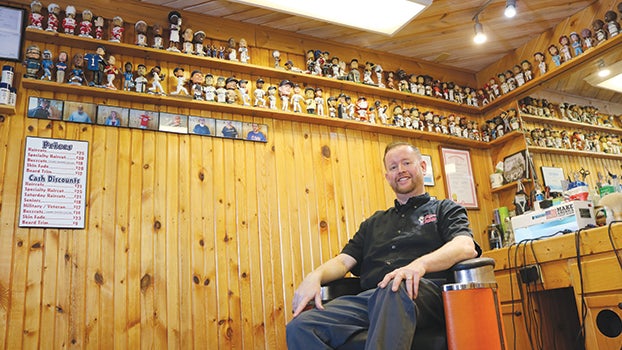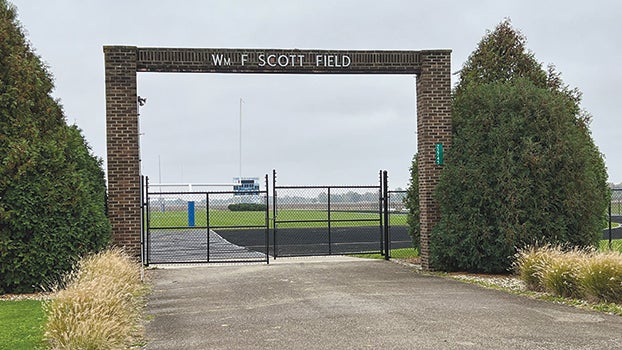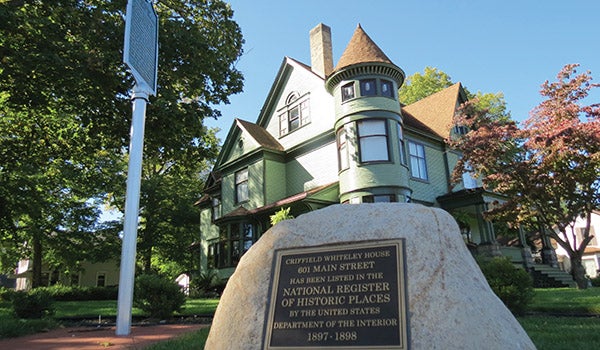Niles city leaders, business owners look to build on resurgence of Main Street
Published 6:04 pm Sunday, March 1, 2020
In a brick building at 3 N. Third St. in Niles, cocktails and gourmet burgers are served where customers once waited to have their brakes aligned. The sound of clanking wrenches has been replaced by clinking glasses, the churn of engines by the hum of conversation.
When Iron Shoe Distillery owners Howard and Laura Tuthill announced in 2018 they would be transforming a former muffler shop into a distillery, many were skeptical, unable to see the vision the Tuthills had for not only the space, but the city of Niles.
Less than two blocks away, another young couple, Melanie and Donny Kennedy had not long before welcomed the community to experience their own transformation. The pair had converted a dilapidated, historic Elks Lodge into an elegant event center called the Fifty5 at the Grand LV. Today, the smell of fresh-baked Italian pastries, homemade soup and cappuccinos emanates from a corner of the building’s main floor. The world-class Italian bakery is one of the latest in a long line of entrepreneurs to buy into the vision for the next chapter of downtown Niles.
Around the corner and down the hill, fitness classes fill a three-story building inhabited for half a century by a travel agency, which recently downsized and relocated. Niles native Stephanie Reno saw potential in the large building, converting the office space to an award-winning Pilates studio that keeps hundreds of people active with a variety of fitness classes.
Downtown Niles is also home to three pizza shops, a tea shop, a coffee shop, a cocktail lounge and ramen bar, four family restaurants, a smoothie shop and a frozen yogurt bar.
People have their pick between two 24-hour gyms and a YMCA, several hair salons and spas, and a handful of antique and retail shops. Multiple office buildings bring foot traffic to downtown during the day, and Wonderland Cinema, which sold more than 750,000 movie tickets in 2019, draws traffic at night.
Butcher paper covers the windows of the few buildings that remain uninhabited. Big, bold letters announce that the structures will not be empty for long.
When Bridgman native Justin Flagel joined Niles Main Street, the city’s downtown development authority several years ago, the city was still working to fill storefronts.
“There wasn’t a lot happening at that point, but you could sort of sense the embers underneath the surface,” he said. “You look at things now, and you can see how they’ve caught fire.”
The flames spread quickly, each new business igniting a spark in other entrepreneurs. Hardly a month goes by without the announcement of a new business in downtown Niles.
Although this change happened quickly, leaders invested in the transformation know downtown Niles did not grow overnight. Niles Main Street director Lisa Croteau remembers a time not so long ago when more businesses were closed than open and, save for the occasional festival, Main Street had very little foot traffic. Today, the challenge is finding a parking spot.
“When I started [20 years ago], Niles was in a low place. It had had its hay day. The corporate rightsizing had taken the corporate America that used to support this downtown away,” she said. “It rebuilt itself with wonderful, independent business owners, and we’ve been blessed to be a part of it.”
BUILDING A CITY
In the nooks and crannies of many buildings that make up downtown Niles, an astute eye can find traces of history through architecture. Aluminum ceilings decorated with fleur-de-lis, exposed brick walls and ornate crown molding have withstood the test of time, serving as the backdrop for countless entrepreneurs — some as far back as the mid-1800s.
Like most cities, Niles was built because of its proximity to the river, which served as the main channel for transporting goods and people before the railroad was built.
“Downtowns used to be where you’d go and get everything,” said Christina Arseneau, director of the Niles History Center. “When you needed a dress for a formal occasion, you’d go downtown. You need a suit, kids need new shoes, you go downtown and buy them, and then you have lunch at the lunch counter.”
In 1848, the Michigan Central Railroad was built throughout Niles, drawing more residents to town to work on the railroad, and enabling more to travel to the city.
For more than a century, downtown Niles evolved to adapt to societal changes, such as the invention of the automobile. Downtown streets were filled with department stores like JC Penney, Sears and Roebuck, Woolworth’s and Montgomery Ward, whose namesake was born and raised in Niles.
“Then they started building malls,” Arseneau said. “There was a movement away from downtown, and that caused trouble for downtown businesses.”
A SHIFT AWAY FROM DOWNTOWN
In the late 1950s, Eastgate Shopping Center was built outside downtown on E. Main Street, following a national trend in erecting strip malls. A large parking lot offered plenty of places to park and walk to a centralized area of businesses in the brand-new shopping center.
Around the same time, the city of Niles began to tear down abandoned buildings once used for industry that had either closed or relocated as technology evolved and became less dependent on the river.
“[Urban renewal] was a national trend where communities were looking to renew spaces that were no longer being used by industry,” Arseneau said.
Though a sore point in Niles’ history for many longtime Niles residents, the impact of the city’s urban renewal efforts can still be found today in places like Riverfront Park, which was built as mills and other buildings were demolished. Today, the park hosts runners and cyclists on its trail, families on its playground and community members of all ages for festivals and concerts.
In 1979, University Park Mall was built in present-day Mishawaka, causing even more department stores to close up downtown storefronts and shift to malls.
“That’s kind of the story of Main Street America, really,” said Mollie Kruck-Watson, who also works with the Niles History Center.
Niles Community Development Director Sanya Vitale agrees that urban renewal has had a continued impact on older residents in the city but attributes the negative feelings that have surrounded downtown Niles the last several decades more to the loss of industry.
“We kind of lost our feel for community [when factories left Niles],” Vitale said. “We were so close knit. We worked together. We recreated together. We went to church together, and then we had picnics together.”
When department stores and industry left downtown Niles, so too did much of the foot traffic and community pride, Vitale said.
“We lost our sense of community, but it’s back!” Vitale said. “We all hang out together again and act like we like each other again.”
CHANGING THE OUTLOOK
In 2012, Sarah Brittin relocated her father’s 25-year-old business from its S. 11th Street location on the outskirts of downtown, to right smack dab in the middle of Main Street.
“Downtown has grown so much that it’s hard to find parking spots right now, but that’s OK, because when you have to park and walk to a restaurant or business, you walk past other businesses and peek in there to see what’s going on,” Brittin said. “There’s so much good happening in Niles that there’s nothing to back up the naysayers anymore.”
Brittin said she is among the first to speak up against negativity found in social media groups, unhappy with the changes that downtown has experienced.
Arseneau and Kruck-Watson hear softer versions of the feedback about the town’s transformation — “less complaining, and more missing what used to be,” Kruck-Watson said.
“The past is safe for people,” Arseneau said. “For a lot of people, it’s a safe place to really believe that things were better, and change is scary because it’s uncertain.”
Bryan Williams, owner of the Brass Eye on Second Street, is the longest serving member and current president of Niles Main Street. Before owning The Brass Eye, Williams owned Trailhead Mercantile, which he sold to the current owners of Rusty Hook Bait & Tackle on Main Street.
“I remember just barely the end of the hay day of Niles. I remember going to Montgomery Ward’s with my mom as a little kid,” he said. “I also remember in high school, my entire class was like, ‘we’ve got to get the hell out of here. There’s nothing to do. There’s nothing for us.’”
Williams moved to Asheville, North Carolina in the late 2000s, and saw how the city was able to thrive in spite of the recession because of its focus on shopping local.
“I thought, ‘Why can’t [Niles] be an Asheville?’ … The number one reason, in my opinion, was a lot of residents just have a really negative outlook,” he said. “I guess I understand the birth of it when we lost all the manufacturing, but I don’t understand why, instead of dwelling on what we don’t have, why not put our best foot forward and try to bring the city up?”
Slowly but surely, Brittin and Williams feel the perception has changed.
“It’s not cool to call Niles uncool anymore,” Brittin said.
Williams said the battle starts small.
“It just takes everybody involved to start talking positively about it,” he said. “If you see a piece of trash, pick it up. If you see a weed in the garden, weed it.”
Croteau feels the key to downtown’s success has been remembering its roots.
“Change is always hard, but it’s also good, and it has to happen,” she said. “This community recognized that and has done a really good job of morphing into something new. I’m sure the people that were here in 1780 did not like what happened in 1840. … It’s not going to be what it was, but it’s going to be wonderful.”
GET DOWN TO BUSINESS
At the turn of the new decade, contractors are working through winter weather to transform a historic post office into apartments and commercial space. The apartments will offer workforce housing and underground parking for tenants, which city leaders said will ideally increase foot traffic to downtown.
“Starting really in 2015, we started working on our place plans,” Vitale said of the city’s efforts to refocus community’s development. “We did a target market analysis to find out what the gap was in our housing.”
The result was to begin developing the Third Street corridor, now home to the new Berkshire Niles Apartments, which offers income-based housing for senior citizens. The development happened as businesses like Iron Shoe Distillery, The Grand LV, Gabrizio Italian Cafe and Bakery and Casperson’s Books and Art opened on Third Street.
“The long-term plan is to do some development down Third Street as far as Bond to continue to spur the growth and redevelopment of downtown,” Vitale said. “It’s a magic time right now in Niles. It’s just really remarkable the type of economic upturn.”
Howard Tuthill, co-owner of Iron Shoe Distillery, said the city’s willingness to work with business owners is why so many businesses are choosing Niles over nearby communities.
“I think the city is very business positive,” he said. “They’re literally an open door for anyone and anything that wants to come into downtown Niles and will do anything they can to help the potential businesses out and be a resource for them.”
Niles mayor Nick Shelton agrees.
“We are here because of people who believe in Niles. Citizens and business owners are willing to take a chance on Niles,” he said. “I think our city council is working hard to make it easier to start a business in our city. We need to continue to limit red tape and make it easier to start up.”
Business owners across downtown agreed that more businesses lead to more business for everyone.
“I think their success is our success, and our success is their success,” Tuthill said.
His wife, Laura, echoed the sentiment.
“I think outside communities are really watching what’s happening in Niles, and they’re seeing all these new businesses come here, and they’re flourishing, and they’re doing well,” she said. ”It’s attracting people from all over Mishawaka and South Bend and some of the lake towns to drive all the way out to Niles, and I think when business owners or potential business owners see that, then they kind of want to jump on that train and get into an area that’s really growing and be part of that.”
WHAT’S NEXT
As of February 2020, Niles residents were anxiously awaiting the opening of Niles Brewing Co., a microbrewery set to open on Main Street. Michael Reed, owner of longtime business Custom Computer Company, has announced plans to revamp the Bell Building, an event hall on Sycamore Street. Williams shared on social media that he would be selling The Brass Eye and moving onto his next business venture; though specific details were not revealed, he promised it would be in downtown Niles.
Frank Ciao’s Waffles will also open shop in spring 2020, serving waffles for breakfast, lunch and dinner. On Front Street, The Rage intends to begin serving alcohol, and a new Edward Jones office is opening. A business with ties to the music industry is rumored to be opening in the former Atomic Bean/Top Heavy Coffee next to Pizza Transit.
Croteau said one of her favorite parts of her job is that downtowns will never stop changing.
“That’s the cool part about any downtown, is because it’s that kind of living, breathing entity,” she said.
As city leadership looks to the next phase for downtown Niles, Vitale said some projects under consideration include a splash pad, drawing more art to downtown, and finding a way to tap into the marijuana business.
“While the downtown is precluded from the marijuana business from a dispensary standpoint [due to proximity to the downtown daycare and district library], there’s a real opportunity for the Airbnbs or a hotel to be cannabis friendly,” Vitale said. “Certainly, I’ve met with a number of developers to try to encourage them to look into it.”
Croteau said the DDA will continue to follow the board’s strategy to attract food-based businesses, building on the entertainment district that is forming on and off Main Street.
As growing business continues to spark new growth, Croteau knows one thing for certain: the city will continue to build on a solid foundation of more than 200 years of entrepreneurial spirit.
“I’ve always hoped that if you could time travel from the 1800s, that they would hop off the time machine and onto Main Street, and they would be happy with what they saw,” Croteau said. “For all the change we have seen, Niles has remained Niles.”







